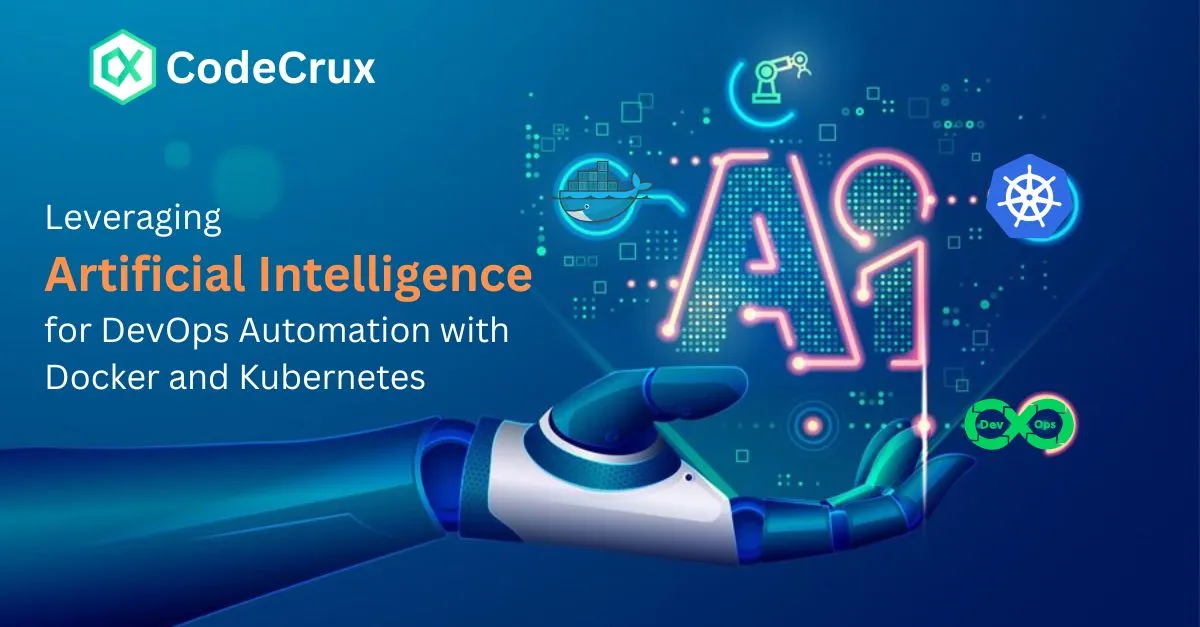Leveraging Artificial Intelligence for DevOps Automation with Docker and Kubernetes

DevOps is the backbone of modern software development, enabling seamless collaboration between development and operations teams to deliver robust applications rapidly. Incorporating Artificial Intelligence (AI) into DevOps, particularly when managing environments with Docker and Kubernetes, can significantly enhance automation, efficiency, and reliability.
In this blog, we’ll explore how AI can optimize DevOps workflows using Docker and Kubernetes, the key benefits, and practical use cases.
Why Combine AI with DevOps?
DevOps automation focuses on improving efficiency and reducing manual intervention. AI can complement these goals by offering:
-
Predictive Analytics: AI algorithms can predict potential system failures or performance bottlenecks by analyzing historical data.
-
Intelligent Automation: AI can execute complex tasks like optimizing CI/CD pipelines and resource allocation without human intervention.
-
Enhanced Monitoring: AI-driven monitoring tools can identify anomalies in real time and suggest corrective measures.
-
Faster Root Cause Analysis: Machine learning models can quickly identify the root causes of failures, minimizing downtime.
When paired with Docker and Kubernetes, AI can take automation to the next level.
AI in Docker Automation
Docker enables application containerization, making it easy to build, ship, and run applications. AI enhances Docker automation in several ways:
1. Automated Image Optimization
AI tools can analyze Docker images to identify and remove unnecessary dependencies, reducing image size and build time. Tools like DockerSlim leverage AI to optimize images.
2. Predictive Vulnerability Scanning
AI-driven vulnerability scanners, such as Clair and Trivy with AI integrations, can predict vulnerabilities by learning from historical vulnerability patterns and CVE databases.
3. Container Health Monitoring
AI-powered solutions can monitor container health metrics (e.g., CPU, memory usage) to predict and mitigate issues before they escalate.
AI in Kubernetes Automation
Kubernetes is a leading platform for container orchestration. AI enhances Kubernetes’ capabilities in several key areas:
1. Intelligent Resource Allocation
AI algorithms can analyze workload demands and automatically adjust Kubernetes cluster resources to prevent over-provisioning or under-provisioning.
Example:
AI can dynamically scale up pods when demand increases and scale down when the load decreases, optimizing costs and ensuring performance.
2. Anomaly Detection
Machine learning models can analyze metrics like pod restart counts, node resource utilization, and network latencies to detect anomalies.
Tools:
-
Prometheus with AI plugins: For monitoring metrics.
-
Kubeflow: A machine learning toolkit for Kubernetes to train and deploy anomaly detection models.
3. Enhanced Scheduling
Traditional Kubernetes scheduling might not always be optimal. AI-based schedulers can analyze historical data and application needs to place pods on the most suitable nodes, improving performance.
4. Self-Healing Clusters
AI can enable Kubernetes to self-heal by automatically redeploying failed pods, rebalancing loads, and restarting services without human intervention.
Practical Use Cases
1. Optimized CI/CD Pipelines
AI can enhance CI/CD pipelines managed via Docker and Kubernetes:
-
Build Optimization: Machine learning models can predict the best sequence of builds and deployments.
-
Error Prediction: AI tools can analyze logs to identify potential build failures before they occur.
Example Tools:
-
Jenkins with AI Plugins
-
RazorOps with AI Automation
2. Application Performance Monitoring (APM)
AI-powered APM tools, integrated with Kubernetes, can:
-
Predict potential performance degradation.
-
Provide actionable insights for optimization.
Example Tools:
-
Datadog with AI capabilities
-
New Relic AI
3. Security Automation
AI enhances security by:
-
Detecting unusual patterns that indicate breaches.
-
Automating compliance checks.
Example Tools:
-
Aqua Security
-
Anchore
Getting Started: Implementing AI in DevOps
-
Integrate AI Tools: Start with AI-powered monitoring tools compatible with Docker and Kubernetes.
-
Leverage Machine Learning: Use tools like Kubeflow to build and deploy ML models for specific DevOps tasks.
-
Enable Predictive Analytics: Integrate AI with existing DevOps platforms for insights into system health and potential issues.
-
Focus on Training Data: Ensure high-quality data collection for accurate AI predictions.
Challenges to Consider
While AI offers immense potential, it comes with challenges:
-
Data Quality: AI requires vast amounts of clean data for training models.
-
Complexity: Setting up AI models and integrating them with existing systems can be challenging.
-
Cost: AI tools and infrastructure may have high initial costs.
Addressing these challenges requires careful planning, starting small, and scaling AI solutions gradually.
Conclusion
Incorporating AI into DevOps workflows with Docker and Kubernetes is a game-changer for modern software delivery. By automating complex processes, predicting issues, and enhancing operational efficiency, AI empowers teams to build resilient systems that can scale effortlessly.
As the DevOps landscape evolves, adopting AI-driven tools and practices will become essential for organizations aiming to stay competitive. Start experimenting with AI integrations today to unlock the full potential of DevOps automation.